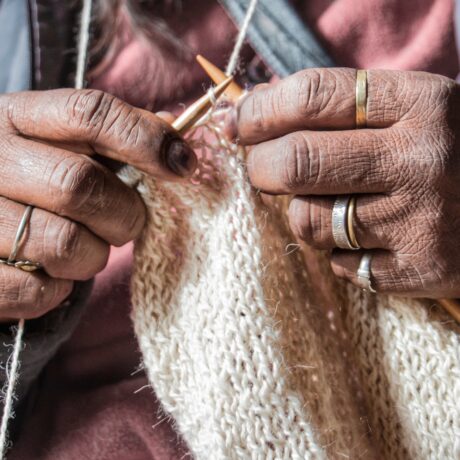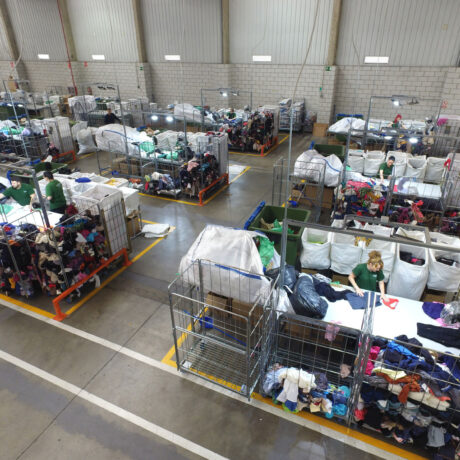We Are All Connected: Working with Artisans in Refugee Situations
I wasn’t feeling so well this morning so I didn’t follow through with my intended plans, which were to join the village in building a playground for the children. However, I was not going to miss my meeting with one of our artisans who is working with us at Ways of Change. I knew that the meeting would be relaxing and stress free and I wouldn’t have to worry about my low energy.
His wife, Lily White joined us on the shaded porch of their home where we always meet, she was toiling obnoxiously long thread into balls for weaving. Lily White and I are friends, I was happy to see her and have the opportunity to catch up. She has a brilliant sense of humor and a lot to say.
Lily White and I spoke for hours, we hadn’t seen each other in a while. I told her that I was going home to the USA for my Grandfather’s 95th birthday and we laughed about having to speak very loudly to older relatives. Her Father, who was sitting next to us, is in the same boat. She showed me the contents of a package she was putting together for relatives living in the USA; they had been resettled as recognized refugees three years ago. We discussed the woes of the post office and international shipping. She shared that her sister, resettled in Finland for the past eight years, starts a new job as a nursery school teacher on Monday. She is excited to work the same hours and have the same holidays as her three children, as opposed to the very long hours she was previously working as a janitor in a hospital.
We talked about our families and their suggestions for our own careers. She told me about wanting to be a nurse because she grew up in a remote village in Myanmar where they didn’t have a hospital. When she arrived at the refugee camp in Thailand she immediately located the hospital and offered to work as a cleaner, with the intention of learning all sorts of useful information for caring for the sick. She deemed these important skills. And she did walk away with many valuable nursing skills, which her family now benefits from.
Lily White told me about her Aunt in the USA. Her husband was in the Karenni Army in Myanmar, they were constantly on the run in order to stay alive; the Myanmar Army was after them. Eventually, they didn’t want to live like that anymore and they made the crossing over the border to Thailand. They began the journey with twelve children and ended with three surviving children. The loss had driven her Aunt to mental illness; she often could be found eating grass and had severe and violent anger issues. Her and her family were resettled in Minnesota, USA. Lily White reported that her Aunt is currently doing very well, she is a part of a women’s refugee group that meets twice a week, she cares for her grandchildren on the other days and her husband works on a farm.
I left Lily White feeling renewed and my spirits lifted. It was a relaxing and enjoyable afternoon, just what I needed.
Unfortunately, we don’t often hear these stories. Rather, we hear tales of refugees which are heavily reliant on the use of deficit language; language focused on the negative (or sad) aspects of one’s story. Stories often meant to appeal to our emotions and inspire a range of actions on behalf of the audience from pity to volunteerism to donations.
These stories allow for an act of heroism on behalf of an organization or an individual who comes in to save the day. They also diminish the possibility of a life of any value prior to the arrival of said organization by reducing refugees to victims with little self-agency.
Of course there is value and potential in every individual’s life, no matter what their current situation. A person who has fled their home, not only has a story of family, culture, skills, love and beauty, but also very defining experiences of conflict, resilience and a search for peace and positive change. These are the stories that Ways of Change, ethical fashion brand, aims to share with the global community.
But it is not only organizations looking to gain recognition that are responsible for deficit language in the world of forced migration.
Look to the broader global discussion only to hear phrases like, “burden sharing” referring to nation states and their responsibility to protect refugees. These are coming from the global influencers, policy makers, including people fighting for humane treatment and conditions for people affected by forced migration.
As the only tool available to us to shape our narratives, language has the exclusive ability to paint ourselves, our world and our unique place inside of it.
On a global scale, this discourse has shaped a model of deficit refugee protection. One dependent on outside resources which are endlessly channeled in before looking towards people’s own skills and potential. From a development perspective, an unsustainable practice.
On the ground, in a protracted refugee situation the manifestations of this language and model are, a predictable reflection of the macro level; ones of unending individual and community reliance. I am not referring to laziness. I am talking about an intense focus on outside assistance, a pervasive attitude lacking in self-worth insofar as empowerment and the ability to change ones own circumstances and a deeply-rooted belief that donors hold the only opportunity for change.
We are working to shift this paradigm to one that builds on refugees’ own skills and ideas. One where people recognize in themselves, an opportunity for the positive change that they want to see. We work with artisans living in refugee situations to collaboratively develop jewelry and accessories using their traditional skills. We offer fair wages, entrepreneurial training and a portion of profits support community projects contributing to the change that the communities want to see.
At the core of our work is the knowledge that many refugees will have a far reach in the future due to repatriation, resettlement or local integration and the belief in their potential to make a positive impact on the world. We are using a different language; a mutually empowering one where I can turn to a friend after a tiring week. One where we are all beneficiaries and valuable people with immense potential.
At the heart of Ways of Change is the belief that all people are connected and have a real impact on each other’s lives. We aim to connect the people making the products with the people purchasing the products and to offer a space of mutual empowerment where all people are positively impacting each other.










